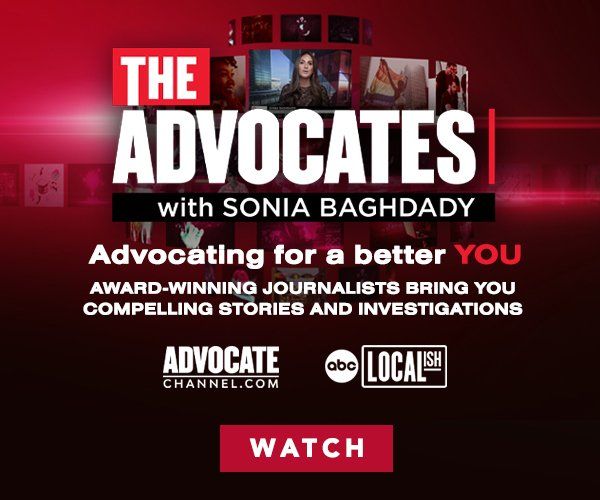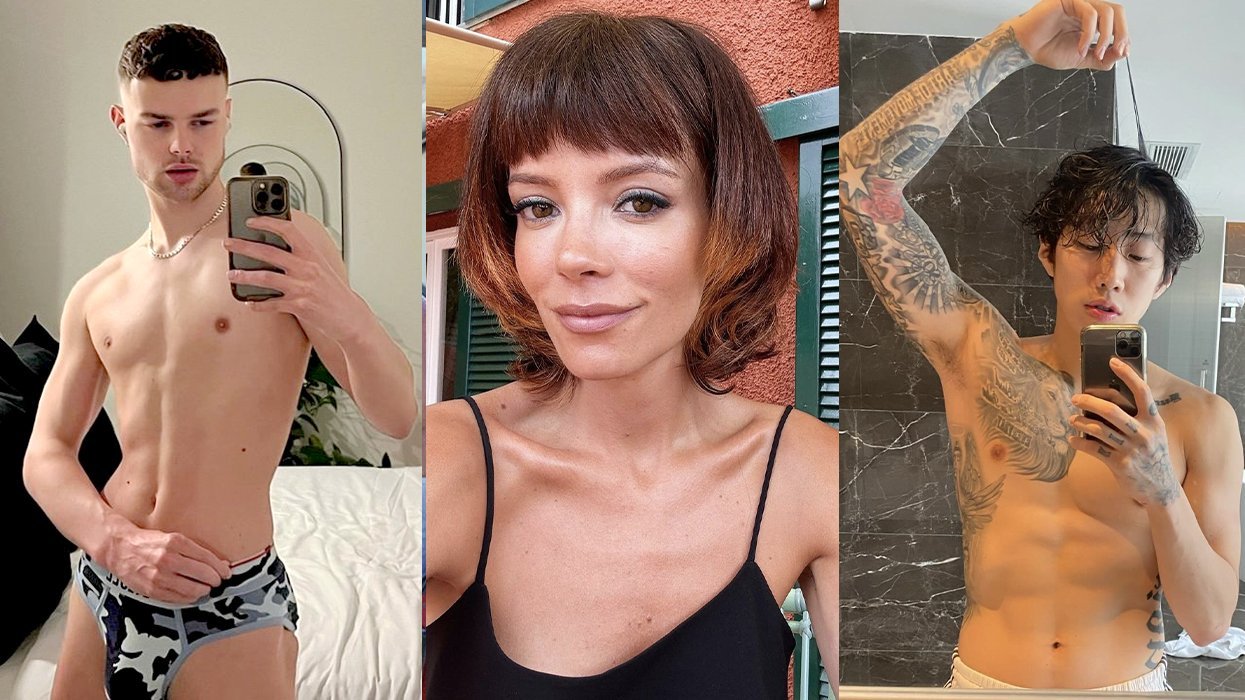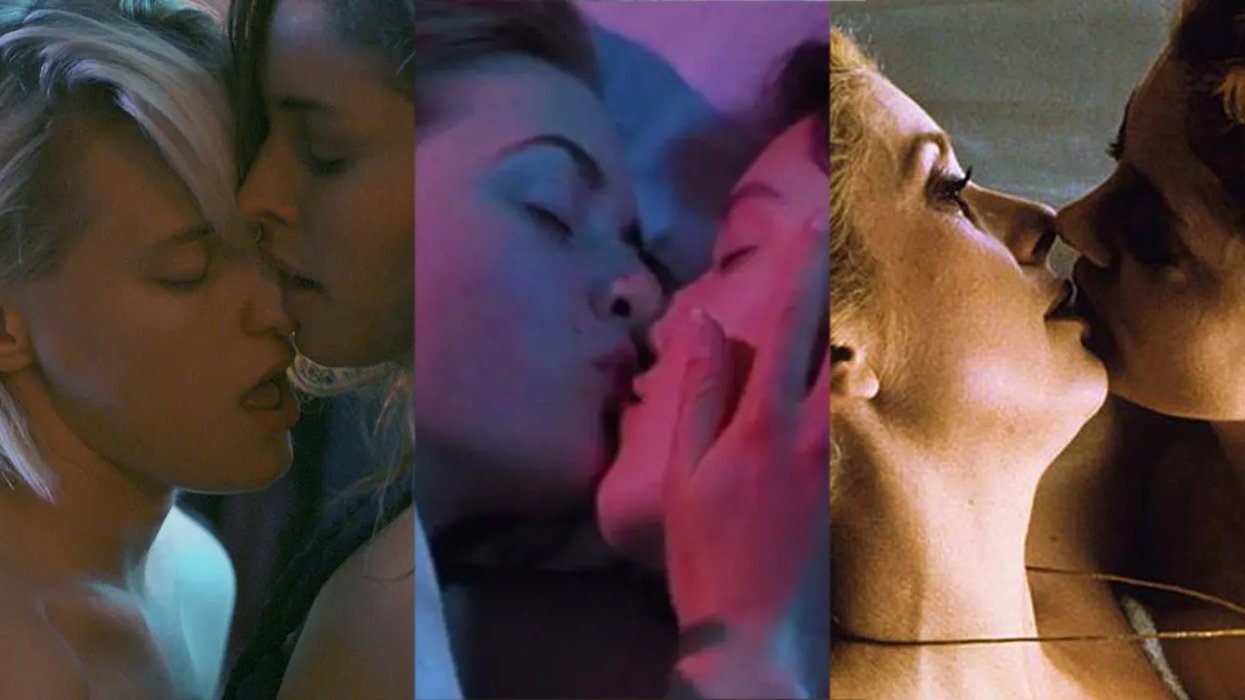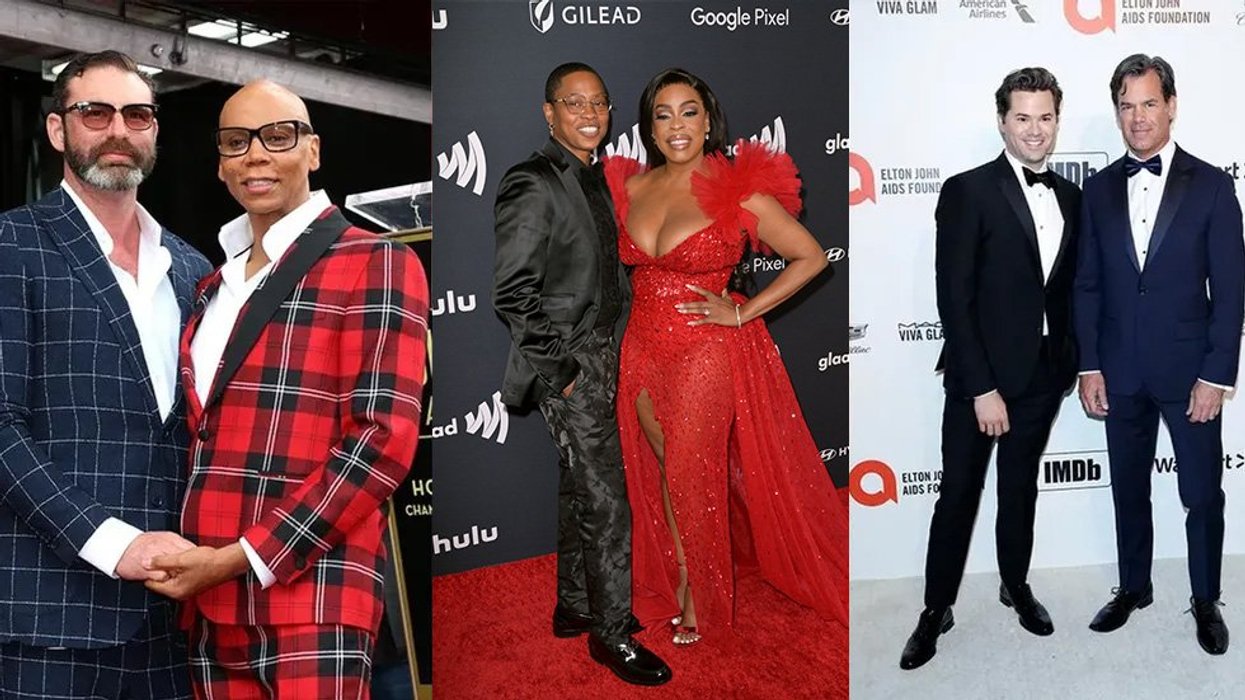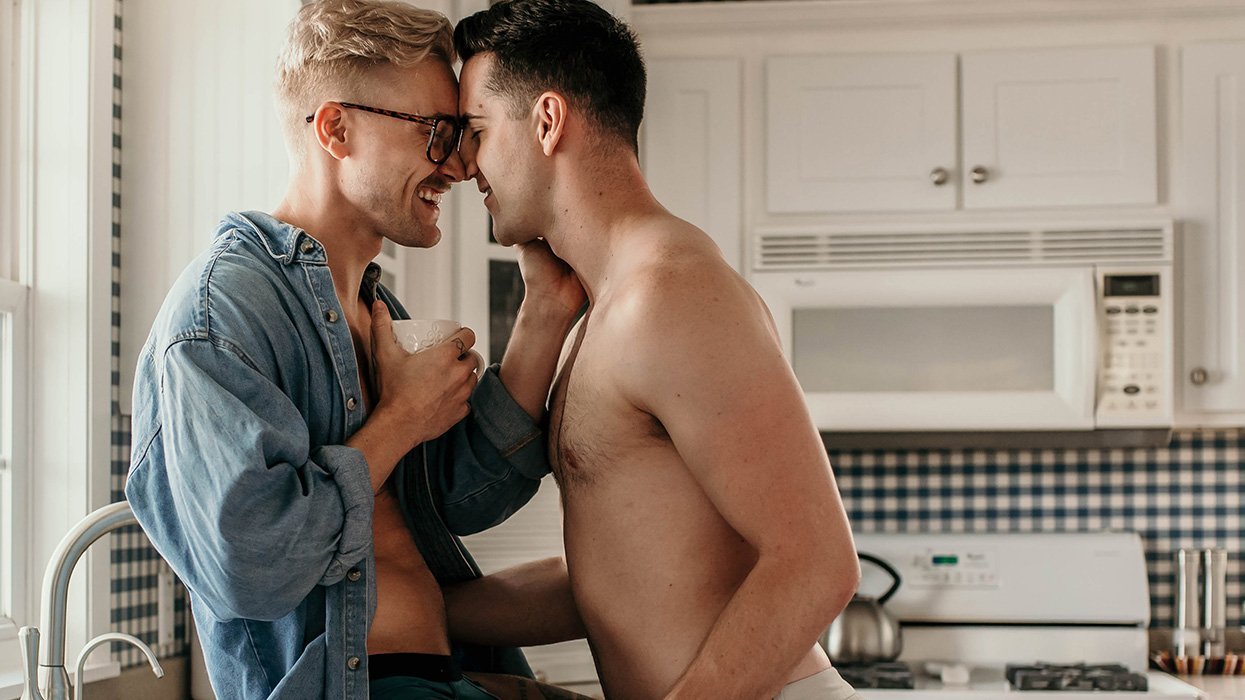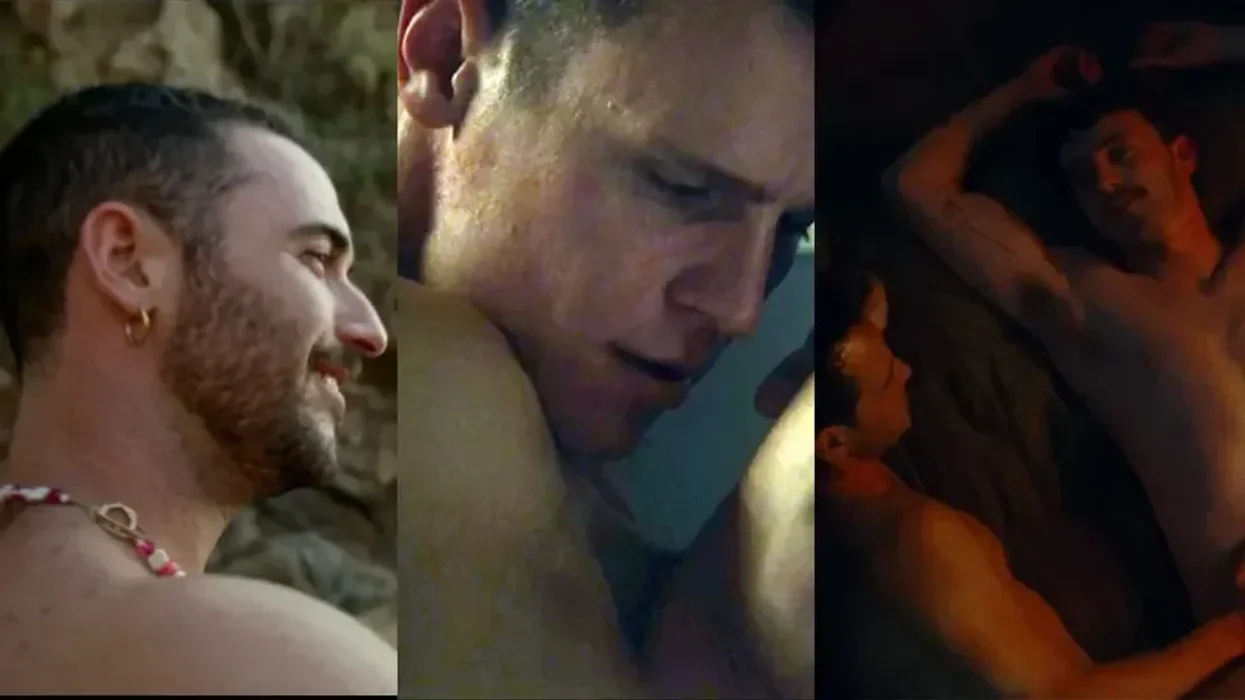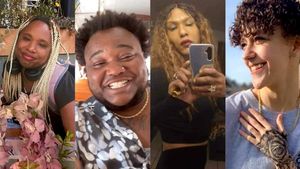Michelle Clunie, best known for playing no-nonsense lesbian Melanie Marcus on Showtime’s Queer as Folk, has an acting résumé chock-full of heavy-hitting performances, but she's also a fierce advocate for full LGBT equality and women’s equality, having lent her time and efforts to events like Meet in the Middle and the National Equality March in Washington, DC, following California's passage of Proposition 8 in 2008. Now she can add playwright to her list of accomplishments, as her first play, Us, is about to open off-Broadway in New York City.
Set in 2008, the year Barack Obama was elected President of the United States, Us is a 21st century American love story about how people meet, communicate, have sex and fall in love in a media-fed world of technology. By focusing on a man and woman, who are madly in love, at such an intense time for the progressive movement, Us examines the power struggles that exist in both the world of politics and a private bedroom.
Clunie didn’t just write the play, she also stars in the production, opposite Jeff LeBeau. Us will run at Theatre Row’s Lion Theatre in New York September 9-29. Despite having the pressure of opening night coming up soon, Clunie took time to chat with SheWired about why she was so inspired to write this particular story, why we (the LGBT community and our allies) need to remember what we, as a movement, can accomplish when we come together, connect (even through social media) and fight like hell, and why the world won’t change until at least 50% of the leaders in all of America's industries are women, until equality becomes a reality.
Tell us about Us - what’s the story that isn’t in the synopsis?
It's so hard to answer that. I'm finding out every day what the play is about. Today my answer will be different from tomorrow because every rehearsal I learn more about it. Right now I feel it's a story about the power of forgiveness, about loving in spite of all the reasons we're given not to. It’s about the power we have when we come together and connect. It's a story about taking responsibility, about accountability. It's about who is to blame – the abuser or the abused? Is it so wrong to skip the fine print in life because you want so badly to believe in the fairytale? But at its heart, it is a love story between two people who are undeniably American. They are both passionate, engaged in their country, in love with life, not afraid to mix it up, and however horrible things get between them, they seem to share that very American trait, optimism. They're both fighters.
Ask me tomorrow and I'm sure I will say it's about the odd sort of entitlement that is ingrained in wealthy, powerful white men. I think of Mark Sanford, John Edwards, and Arnold Schwarzenegger. I think of the women who put up with them and I am floored. Everyone who met Elizabeth (Edwards) knew she was the brains behind John. Maria (Shriver) would have made an incredible governor and yet she stood behind this man who was not even close to her equal. I am astounded and perplexed as to why these men feel they are entitled to do anything they want, and why we let them get away with it – in the bedroom, on Wall Street, with our economy, with our laws – at what point do we say “enough,” in our personal lives and in our country? The world will not change until females take a stronger position in leadership roles.
To do that, we have to gain equality, passing the ERA might be a nice start. Not allowing wealthy white men to run the country and get away with any and everything will help. I am interested in equality and until 50% of the leaders in this country are women – in politics (right now it's only 17%), as writers, as artists, as CEOs, involved in every aspect of the country – until that day I will more than likely think, speak and write about it.
What made you write about this particular time in America, and this particular part of the way culture is changing in America, as opposed to any other subject?
It was a very special year. We had, for the first time, an African-American and a woman as the frontrunners in a primary, and eventually elected the first African-American President. Social media made that possible, people were empowered like never before. We felt as though there was nothing we could not do. After eight years of feeling hopeless it was like the walls opened up and the ceiling blew off and the sky was the limit. I think it was one of the greatest years in American history. It's interesting to me that no one has tried to capture that year in theatre and film until now. There was Game Change (HBO's film about Sarah Palin), but that was about the other side. I wanted to capture the hope and the love that was felt that year. I have traveled and there is no doubt that as a people fighting to take back our country, we inspired the world. At the same time we ran smack into the worst financial collapse since the great depression. So in the face of being brought pretty much to the brink, we kept our heads held high and we fought like hell. We can never lose sight of what we can accomplish when we come together. That year deserved to be written about.
It’s the first play you’ve written. How long were you thinking about writing it before you actually got around to putting it on paper? How long did it take you to write it? What were the biggest challenges you faced while writing it?
I have wanted to write since I was a young girl. My brother is a poet/writer as well as my mom's cousin, Jim Cash. Jim was a lovely man. He wrote Top Gun and plenty of other blockbusters. Writing was always around, it was being talked about, and a possibility that I knew of. I wrote a lot growing up, mostly poems and stories, and as soon as I went into the theatre I knew I would write a play one day. I did a workshop of Arthur Miller's After the Fall and fell madly in love with it. I always wanted to do a female version.
My play was fashioned by his structure many drafts ago but has now become it's own animal. It's an idea that I have had for about twelve years. I wrote the first draft in five days. I would then go off and do acting jobs and whenever time permitted I would do another draft. I have no idea what draft we are on now because it all blends. I do know now that writing is like a private hell that only the writers’ footsteps know. Acting is so very different. Writing is private and internal. Rewriting is like surgery – you have to be delicate. At the same time you can't be afraid to be messy and bold and to not underestimate your audience. My biggest challenge was that I wanted to find a structure that communicated the various realms we live in, including the virtual realm. I also wanted to create something magical that jumped from past to present and beyond time.
More on next page...
\\\
(continued)
Without giving too much away, what is your favorite part of Us as an actor? What about as a writer?
There is a real American-ness about the project. As I said, these two characters have an undeniably optimistic outlook about them that is purely distinct to America. They are almost throwbacks in a sense. I love that. As you know, I have a real love affair with the best of America – not the worst – but the best of what we can be. My mother embodies this quality. I love a can-do attitude. I love a person who takes lemons and makes lemonade. My mom is a southern woman and she has that Scarlett O'Hara thing in her where if she had to pull the curtains down and make a dress, damn it – that’s what she would do. She passed that on to me – never give in and never give up, tomorrow is a brighter day. When I was writing the script, I would read pieces of it to her over the phone and she would say… "Always leave them with hope!"
I guess as an actor I find that “beautiful” to be hooked into that “optimistic” quality, that no matter what happens to these characters there is always that thread. As a writer, I love the repartee. It's almost as though these two people, deep down, are a vaudeville act. They share a love for humor and, even in the their darkest moments, they find the wit, even if it is simply a recognition of some subtle word play. They might not acknowledge that they like it but it is in them.
Us is set in 2008, a very exciting year for America. What is your best memory of that year?
I was on a soundstage shooting when Obama won. I was just about to shoot a very dramatic scene when I received a text from a dear friend telling me we had won. I got chills and dropped to the ground. I just thought, "We did it!! We took back our country; we can get on with the business of being the real America once again.”
And the worst?
Hillary's concession speech. I campaigned for her. I love her. It does not get any better than her. As a woman that moment hurt me to my core. I have thought about it a lot since. We still live in a country that has not passed the ERA. That is a fact. Only four percent of the Director's Guild members are women, only 17% of politicians are women, only 17% of playwrights are women. We have to change that if we are to make any progress because it is a known fact that having more women in politics means a healthier country. It is still a man's country and it is up to us to change that. Part of why I wanted to write is because I want to be part of telling women's stories. Women need to step up and get their voices out there and we will all be better for it. Hillary 2016.
Most people know you as the actress who played Melanie Marcus on Showtime’s Queer As Folk. The show has been over for a while now in the US, but QaF just did a press tour in Germany, which you attended. What was it like reconnecting with the cast and legions of devoted QaF fans?
Great! I see the boys because we all live in LA (except for Randy Harrison who played Justin) but now that I am in NY I have been able to hang out with Randy. Robert and I went to Paris before the convention and Scott (Lowell who played Ted), Randy, Robert (Gant, who played Ben) and I went to Berlin after. It was great to see Sharon (Gless, who played Debbie). I haven't seen much of her as she is in Florida working but she is and will always be one of my favorite people in the world. The last night we stayed up talking and I just wanted to take in her face, her sweet eyes. The fans were the best. We simply have the smartest, nicest, most interesting fans in the world. Some of the fans from the convention are coming to the opening and shows throughout the run, so it will be great to see them again.
More on next page...
\\\
(continued)
You’re spreading your wings with this writing credit under your belt. Are you going to continue writing?
I have talked with a couple of different people about writing a movie. I also have another idea for a play that would involve going to Morocco to do some research. I want to expand. I would like to see how much I have inside me and push myself – always with an eye for telling really strong exciting female stories. I think writing a TV show or film could be wonderful. It would have to be the right situation. I'm spoiled. I don't have to answer to anyone right now. I understand why Woody Allen wanted to create his own kingdom outside of the business. Once you're in bed with the studios you have answer to them. Here you spent three years writing a script, and in one afternoon after some producer reads it over dinner with the telly on in the background, they give you a couple of notes and want to change the entire thing. I think I would lose my mind. That is the reason why people want to do independent projects. When I write in the script “the footage is in black and white,” as of now I have the power to insist it is in black and white. Had this been a studio project we might have had to shoot that footage in color. As it stands though, our footage turned out so beautiful that one of our investors is interested in doing the play as a film, but we'll see where we are after this first run is done. Right now I just want to focus on this production and do my best.
You star in Us with Jeff LeBeau, under the direction of Jennifer Gelfer. Tell me about the team…
Jennifer Gelfer, my director, and I studied together under Milton Katselas during the Golden Age when he was turning out a lot of wonderful artists, directors and actors. We both admired one another's work and always talked about working together. Throughout the years we lost touch, and then when I moved to New York for a period we reconnected. It really is the collaboration that has been waiting to happen since 1992. I pulled her into this as a director because she has a real vivaciousness and this material demands it. These characters are big and bold – they’re not meek. She also isn't afraid of the softer, romantic moments. I also knew that because we came up under the same mentor, we spoke the same language.
As for Jeff, when I started writing this character I couldn't hear the voice and then one day I thought, “who in the world would play this character?” He popped into my head. I hadn't spoken to Jeff for a while (like Jennifer, he had been in this very intense workshop under Milton. In fact, what's funny is the three of us did a reading of After the Fall and were thinking of doing a production of it). So, one day, I was out in Los Angeles hiking up in the canyons. I had just finished the first draft, when who comes walking around the corner but Jeff. I hadn't seen him for years. I ran into him up in the middle of the canyons, grabbed him and said, " I was just thinking about you! I wrote a play and you have to do it!" They have been through three years of workshops and one very successful staged reading. I could not do this without their commitment to the material and to me. Jen is very firm and steady in her direction and piecing the moments together as we jump from past to present. I get to discover it all over again as an actress through our collaboration.
Also, can I just say, I am in love with our design team. We have put together a wonderful group of artists. I call them the dream team. I asked David Mauer, the technical director of Rogue Machine to come to New York to design our set and he said yes. Having him here means the world to me. David is the kind of person you can turn to and ask for anything and he will get it done, or he will help out others without them asking for it. He is the hardest worker and problem solver – he is invaluable. He read the script and got it immediately and designed a lovely set for us. Doing your own project means you get to handpick who you work with and choose people who really love what they do. I am working with people who are talented and who are in it for the love of theatre. It is indeed a labor of love.
You’re quite the activist for several causes – LGBT equality, HIV/AIDS, women’s rights. Aside from Us do you have any passion projects you’re working on right now?
Right now I am working on creating an eye-drop called "actress/writer/creative producer." JK. I will be working non-stop until October 1st. After that, I have some ideas, offers, and thoughts of what I want to do next.
Just for fun, what is your favorite piece of technology? Least favorite? Why?
I am not into the iPad. I have one – it’s just not me. Maybe I will learn to appreciate it more. My iPhone, however, is attached to me 24/7. I have been so busy that I actually sleep with it in my bed. I do emails right before I go to sleep, set the alarm on it and then wake up and get 20 emails done before I even put a foot on the ground. I even place it on the pillow next to me sometimes. It's only because I'm ridiculously busy right now. I am also addicted to my Macbook Pro. I am on it right now. It is the greatest computer I have ever had. My director, Jennifer, laughs at me because she thinks I am extremely codependent with it.
As for apps Hopstop and AroundMe are lifesavers. Working in New York it seems I'm always in a different neighborhood with rehearsal, dinners, meetings, and wardrobe fittings, so Hopstop helps me navigate the subway and with AroundMe helps I can go into any neighborhood and find anything I want immediately.
Us will be at The Lion Theater September 9-29, are there any plans to take it somewhere else once this run ends?
I would like to take it to London. I pitched it to a producer in London who might be interested. I know in my heart that it would do very well there.
What is next for you?
Possibly London, possibly back to LA, or maybe I will just stay in New York. I am having a love affair with the city right now and if it loves me back… then I might just start a new chapter of my life here. But really, the most important stop after the show is Portland, Oregon for my mother's birthday. My family means the world to me. They keep me grounded to what's real. I miss them constantly. I cannot wait to be around them – laughing, being silly, playing card games and making memories. I treasure those moments.
Anything else I didn’t cover?
It's funny, one day a friend of mine asked me what the play was about and I said, "I wanted to write a love letter to the world, to love, to art, to fighting for what you believe in, to America." She said, "Well, it's never been like you to hold back." I don't know if that is what I did. All I know is there is this Arthur Miller article from an old issue of Harper's I found online where he talks about how the play should hold some mystery even to the playwright or else it isn't a play. You have to be courageous enough to leave certain things unsaid, ask the questions but don't feel compelled to supply all the answers. You have to leave space and breathe for the audience to partake in the dialogue with the play. That to me is why it is not yet born until you share it with an audience. The moment it is shared it becomes a play, a living, breathing piece of art, a moment in time, a little slice of life… and life has an aspect of mystery to it…
Visit the Us website for show information, and purchase tickets here.
Follow SheWired on Twitter!
Follow SheWired on Facebook!
